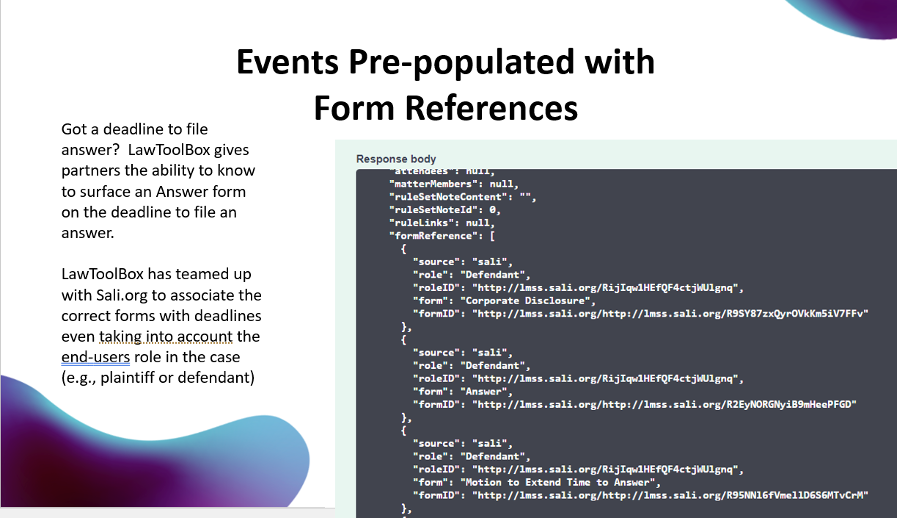LawToolBox Announces it is SALI Compliant!
by Sherry Metzger, Esq.
In March, The Standards Advancement for the Legal Industry Alliance (SALI) announced the release of Legal Matter Specification Standard 2.0 (LMSS 2.0). Damien Riehl, Vice President for Litigation Workflow and Analytics Content for FastCase, “led an effort to migrate the LMSS to a graph database (RDF/OWL),” stated the press release. SALI improves industry efficiency by creating a common language, or “tagging” system, which increases the interoperability of end-users such as law firms, clients, and legal service providers. With the release of LMSS 2.0, “[t]he taxonomy has expanded more than six-fold to almost 10,000 categories (essentially tags) that the legal market uses to describe its services in detail, and in a way that is comparable across organizations,” stated the press release. Additionally, the release stated that a “significant portion of the expanded set of descriptors relate to litigation, including causes of action, document types, phases, and more, enabling robust definition and categorization of a wide variety of key aspects of disputes.” (You can learn more about SALI and read the entire March press release here www.sali.org).
What does it mean for LawToolBox to be SALI compliant? “If you incorporate one [SALI] tag, you are SALI compliant,” explained Riehl on Episode 171 of the LawNext Podcast. (You can listen to the episode here: LawNext: Ep 171: Damien Riehl on the SALI Alliance and Setting Data Standards for the Legal Industry (libsyn.com)). Host Bob Ambrogi, a legal innovation thought-leader, spotlighted SALI in his interview of Riehl on the podcast that showcases innovators and entrepreneurs in the legal industry. “Sali labels enable us to relate forms to deadlines and group them based on roles, such as, ‘Plaintiff’ or ‘Defendant’” says Jack Grow, LawToolBox CEO and founder.
LawToolBox is “SALI tagging” it’s deadline API so that third parties can surface their own proprietary forms at the exact moment in time the end-user needs it based on their matter deadlines. For example, when LawToolBox calculates a “Deadline to file an answer” in a particular jurisdiction, if a matter is set up by a plaintiff LawToolBox surfaces Sali references suggesting that a “Motion for Default Judgment” could be filed, or if a matter is set up by a defendant LawToolBox surfaces Sali references suggesting that an “Answer” and “Corporate Disclosure” could be filed:

The third party can use these references to surface forms from their own proprietary libraries. These Sali references can be used to connect different systems and platforms even without the legal software vendors formally collaborating, creating the potential for an even more streamlined and automated way to manage their law practice.
Understanding the usefulness of this conformity, Ambrogi stated to Riehl, “You’re talking about not just tagging, but using tags to show context and relationships more than standard codes would do.” Riehl replied, “[SALI is] enabling interoperability amongst all players in the ecosystem. That has never been done before.” The host and his guest commented that more clients and law firms are demanding this interoperability, as well as “intracompany” metadata tags because they improve queries, comparisons, and relationships when it comes to running analytics.
It was the novelty of the idea that had Riehl missing boat-time on his family’s lake in Minnesota, as he worked over the possibilities and benefits of standardizing the system. Explaining that “it needed to be done” in a system that had until then only included content and process standardizations, SALI was positioned to standardize the metadata component. “You don’t have to recreate the wheel,” Riehl said. “We’re all counting the same things, so we should be using the same language.” SALI essentially eliminates the need for one-to-one mapping of terms by standardizing the language across the industry.
With active participation by its members, including other industry leaders such as LexisNexis, NetDocuments, Ogletree Deakins, Microsoft, and Intel, SALI is constantly improving the compatibility of its tagging system with real-time users. For example, if a law firm uses a particular tag that is not among the 10,000 in the SALI system, it can notify SALI to add the tag. The resulting organic and collaborative growth of the system establishes a world-wide language that has implications for court use and the improvement of access to justice programs. As a free, open-source platform that is planning to release an open application programming interface (API), SALI is leading the integration of systems and services across the legal industry.
For more information contact:
Carol Lynn Grow, COO
